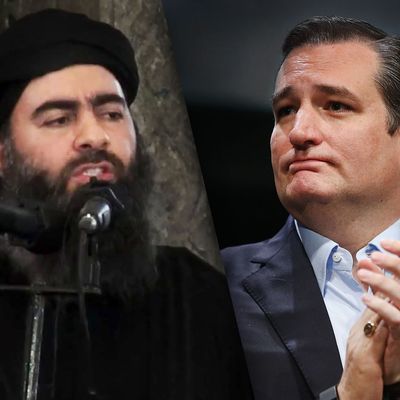
This week, the Federal Reserve raised interest rates for the first time since 2006, a maneuver that will slow the pace of growth and tamp down the already-too-low rate of inflation.
Even so, a number of Republican candidates have voiced real concern about the rampant (read: very mild) price increases eroding the money in voters’ wallets and bank accounts. And to solve that (demonstrably nonexistent) problem, they want to radically change the Fed itself. Yes, readers, we are talking about goldbuggery, espoused with varying degrees of thirstiness by Rand Paul, Ben Carson, Ted Cruz, and … ISIS. Indeed. In one of the more deliciously wacky coincidences churned up by the 2016 election thus far, America’s most insane foes and America’s most insane would-be commanders-in-chief have cottoned on to the same, most insane monetary-policy belief.
Needless to say, economists are generally far less enamored of the gold standard than today’s conservative politicians and murderous theocrats. The University of Chicago’s Booth School of Business periodically asks top economists what they think of a given policy or economic issue. A few years ago, they asked them whether they agreed or disagreed with this statement: “If the U.S. replaced its discretionary monetary policy regime with a gold standard, defining a ‘dollar’ as a specific number of ounces of gold, the price-stability and employment outcomes would be better for the average American.”
Not a single one agreed, including some notable conservatives. The response from Chicago’s Anil Kashyap: “A gold standard regime would be a disaster for any large advanced economy. Love of the G.S. implies macroeconomic illiteracy.” From behavioral economics expert Richard Thaler: “Why tie to gold? Why not 1982 Bordeaux?” From former Obama official Austan Goolsbee: “Eesh. Has it come to this?”
Oh, it has. In one debate, Cruz confessed his “deep concerns” about the Fed. “I think the Fed should get out of the business of trying to juice our economy, and simply be focused on sound money and monetary stability, ideally tied to gold,” he said. He later added that the United States had latched its currency to gold “for about 170 years of our nation’s history and enjoyed booming economic growth and lower inflation than we have had with the Fed now.” (Again, inflation is low and growth is looking pretty good, for what it’s worth.)
ISIS, perhaps unsurprisingly, goes somewhat further. Earlier this year, Al Hayat Media Center, its media arm, released a snazzy, high-production-value hour-long video entitled The Rise of the Khilafah: Return of the Gold Dinar. The United States is “[heading] a capitalist financial system of enslavement, underpinned by a piece of paper called the Federal Reserve dollar note, which they alone printed and imposed on the rest of the world,” it blares, promising “the return of the ultimate measure of wealth for the world: gold.” At one point, Ron Paul shows up, though its promised gold-based currency system has not, at least not yet.
Granted, the two see some form of a gold standard acting in very different ways — Cruz imagining it unleashing growth and moderating (the very low rate of) inflation here at home, ISIS imagining it as a “blow to America’s capitalist financial system of enslavement.” And granted, Cruz and ISIS do not share that many common macroeconomic prescriptions. The terrorists seem much more enamored of taxes than Cruz does, for instance.
Even so, both seem wrong when it comes to the upsides of fiat money and the cost-benefit of discretionary central banking. The valuation of currencies based on gold are tied to fluctuations in the supply and demand of gold, and monetary systems based on gold have far less policy capacity than those without a hard standard. If the economy goes south — when the economy goes south — Janet Yellen will have the ability to drop interest rates all the way back down to zero and then start more quantitative easing, if necessary. It might not work very well this time, given that money is already so cheap. But it would be better than nothing. So let’s hope that neither Cruz nor ISIS’s economic dreams become reality.





























